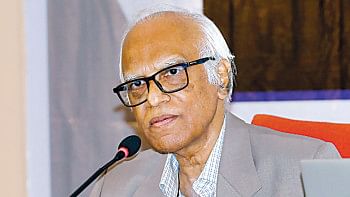A failed saint

To promise peaceful reconciliation and then make it impossible makes violent extremism inevitable. These words come to mind as the Rohingyas flee from Myanmar to save their lives while Suu Kyi, state counsellor and NLD leader, first remains silent and now seems to endorse ethnic cleansing.
Oxford educated and an honorary fellow of the School of Oriental and African Studies (SOAS), Aung San Suu Kyi and her family returned to Burma in 1988 to care for her ailing mother. Burma was tense with mass demonstrations for democracy after General Ne Win had stepped down in August. Suu Kyi addressed a gathering stating, "I could not, as my father's daughter, remain indifferent to all that was going on." While her English husband and her sons returned to Britain she formed the National League for Democracy (NLD).
Claiming to be inspired by Mahatma Gandhi, she held peaceful rallies for free elections. They were suppressed by the army who seized power in September 1988 and later placed Suu Kyi under house arrest. The military government offered her freedom if she left the country for good, but she bravely refused.
She remained under house arrest or in prison for 15 years, over a 21-year period. The military regime offered to let her go abroad, but it was evident she would not be allowed to return. In 1995 she met her husband in Myanmar for the last time, four years before his death from cancer.
After a bloody suppressed 'Saffron Revolution', in November 2010 Suu Kyi was released. It was apparent that the regime saw they needed rapid economic growth to escape the sanctions imposed by western governments.
In 2015 the military government of President Thein Sein held the first openly contested general election in 25 years. The NLD won two-thirds of the contested seats in parliament (a bloc of 25 was reserved for the military). As her children held foreign passports Suu Kyi could not run for president. However, as the undisputed NLD leader, she is Myanmar's de facto leader.
So what is this respected woman and active proponent of human rights and democracy really like?
Her Nobel Peace Prize awarded in Oslo on June 16, 2012 was described as the "most remarkable in the entire history of Nobel Prizes." Her acceptance speech stated "...when the Nobel Committee awarded the Peace Prize to me, they were recognising that the oppressed and the isolated in Burma were also a part of the world, they were recognising the oneness of humanity... The prize we were working for was a free, secure and just society where our people might be able to realise their full potential."
When asked after the NLD's 2015 victory what democratic model she intended to see in Myanmar, Suu Kyi replied, "We have many lessons to learn from various places." She would not make changes too soon but would aim for reconciliation, like Nelson Mandela.
Yet now, her silence in the face of the persecution of the Rohingya Muslim minority has turned to open endorsement of the latest military crackdown while denying, as misinformation, its violence and carnage. She appears to accept the real misinformation—that the Rohingya are illegal immigrants.
Some Rohingya Muslims are recorded to have been in Buddhist-majority Burma since the 12th century. There are around 1.1 million Rohingyas in the coastal state of Rakhine. During the British rule (1824–1948) more entered as labourers, but since Burma was a province of India such migration was considered internal (Human Rights Watch). After independence Rohingyas who could prove residence for at least two generations were allowed to apply for a form of ID card. But the 1982 citizenship law did not recognise them as one of the country's 125 official ethnic minorities. They had long suffered discrimination, including movement restrictions, withholding of land rights and exclusion from education and public service. They essentially became stateless. By 2013 Human Rights Watch was already protesting ethnic cleansing and large numbers had fled to Bangladesh. In 2015, the 14th Dalai Lama, the most revered Buddhist leader, requested Suu Kyi to help the Rohingya, but was ignored.
To stem international condemnation, Suu Kyi in August 2016 asked for recommendations from an Advisory Commission led by Kofi Annan. Its mandate was flawed as it was limited to development, health and education in Rakhine and excluded human rights violations. She claimed to welcome its initial recommendations but made no move to implement them. The final report calling for an end to violence and a review of the basic citizenship issue has been ignored. The government claims the burning of 60 villages was the work of the Rohingya themselves and describes the newly formed Arakan Rohingya Salvation Army (ARSA)—a virtually unarmed peasant resistance group—as "terrorists".
She has failed both morally—in terms of the Rohingyas' suffering—and as a national leader in the face of Buddhist nationalist intolerance. For decades Rohingya village elders have tried to restrain their young men but violent military suppression has not only now brought doomed attempts to fight back but has opened the path to Islamist extremism amongst a minority people whose tradition has been more peaceful Sufist Sunni. According to International Crisis Group, ARSA and its leader have links with Rohingya groups living in Saudi Arabia and Salafist influence is growing. The refugee influx is not only a threat to Bangladesh but also to the world.
Suu Kyi once said, "It is not power that corrupts, but fear. Fear of losing power corrupts those who wield it and fear of the scourge of power corrupts those who are subject to it." Now that she has seemed to abandon her own ideals, is she now corrupt? Insensitive, politically sharp and ambitious, Suu Kyi has created more problems than solutions.
Selina Mohsin is a former ambassador.






Comments